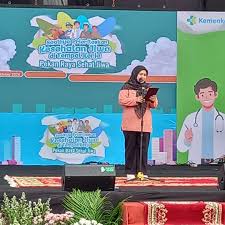There are tens of booths at the event at Jakarta International Velodrome on Sunday (13/10), including hospitals, community health centres, directorates, platforms, organisations that focuses on mental health, and psychologist and psychiatrist organisations and associations, and communities.
Unicef, CIMSA, Into the Light, Otsuka, Yayasan Alzheimer Indonesia, POP-TB, Ikatan Psikologi Klinis Indonesia, and USAID Momentum offered education, while organisations such as the Community Health centres in Pulogadung and in Cipayung, Ibunda.id, Soeharto Heerdjan Hospital, RS Ketergantungan Obat (Hospital for Drug Addicts), National Mental Health Centre (Pusat Kesehatan Jiwa Nasional) Marzoeki Mahdi Hospital, NBP Center-Dyslexia Support Group provided screening and counseling.
There is also First Aid launching for Psychological Wound (Pertolongan Pertama Pada Luka Psikologis or P3LP). This is most basic and simple aid or support for people experiencing serious events that leave them with psychological wounds.
The Secretary General of the Ministry of Health Sekjen Kemenkes, Kunta Wibawa Dasa Nugraha opens the fair that has a theme highlighting the priority for mental health at workplaces, that encourages rewards, no matter how small. Prioritising mental health at workplaces is critical step to create a balance between employees’ performance and welfare. Workplaces with health mental health can increase productivity, creativity, and welfare. Conversely, workplaces with bad mental health – with heavy pressures, stigma, and discrimination – would lead to psychological distress. If employees are not comfortable in their work, sooner or later they will have psychological stress such as anxiety and depression that would affect productivity.
The author visits a number of booths, including Yayasan Alzheimer Indonesia (the Association of Alzheimer Indonesia) and, meet withTuti Sunardi who explains that a person is diagnosed with dementia worldwide for every three seconds. Indonesia is one of the five countries in the world that has highest number of elderly people. The Indonesian Bureau of Statistics data in 2020 shows that the elderly population is 9.92% of total 279 million Indonesian population or 27 million people.
The next booth is Mother Hope Indonesia – a non-profit organisation working in perinatal mothers’ mental health. This community focuses on giving emotional supports and education to pregnant women and women after giving birth, particularly women who experiences mood problems and depression after giving birth. After a talkshow session, Mother Hope Indonesia provides education and workshop on journaling.
The author visits the booth of Indonesian Schizophrenia Alliance (Komunitas Peduli Skizofrenia Indonesia or KPSI) and meets with the founder, Bagus Utomo. KPSI was established in 2009 when its facebook page was set up for community education, and it has now 75,000 members. KPSI has program oriented towards education and services to people with mental problems, particularly those with schizophrenia, as well as legal and law supports. Members of KPSI are not only survivors but also caregivers, professionala such as psychologists and psychiatrists, and the general public. There are survivors within KPSI who are present and show their businesses – food products and handicrafts. (Astuti)












